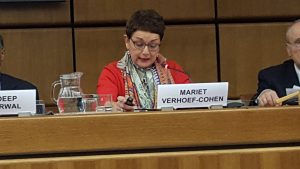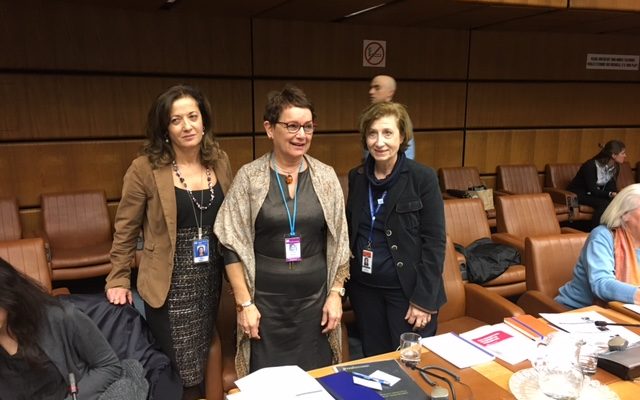ACUNS Vienna-UN Annual Conference ‘Implementing the 2030 Agenda: A New Vision for Development – The Contributions of UN Vienna-based Organizations’, took place 17-19 January 2017. Hosted by the United Nations Office on Drugs and Crime (UNODC), the conference brought together major-stakeholders, including the diplomatic community, academics and civil society organisations including Soroptimist International.
Focusing on the major challenges and opportunities related to the implementation of the 2030 Agenda, Soroptimist International President-Elect, Mariet Verhoef-Cohen took her place as panellist on ‘Safeguarding the Environment and Sustainable use of Water Resources’.

SI President-Elect, Mariet Verhoef-Cohen speaks at ‘Safeguarding the Environment and Sustainable use of Water Resources’.
Mariet joined Director of the Environment Branch, UNIDO, Stephan Sicars; Head of UNEP Vienna, Harald Egerer; Programme Manager for Water Resources and Head of the Isotope Hydrology Section, IAEA, Pradeep Aggarwal; Chief of Sustainable Livelihoods Unit, Co-ordinator of the Global Wildlife and Forest Crime Programme, UNODC, Jorge Rios; Programme Officer, Space Applications, UNOOSA, Lorant Czaran; Emeritus Professor, Institute for Water Management, Hydrology and Hydraulic Engineering, University of Natural Resources and Life Science, Vienna, Hans-Peter Nachtnebel.
Mariet explains: “It was an honour to be asked to speak at ‘Safeguarding the Environment and Sustainable use of Water Resources’, and the connection between water and women. Survey data for 25 sub-Saharan countries indicate that women spend a total of 16 million hours a day collecting water: 16 million hours which cannot be spent on other activities such as education or income generation. This clearly shows just how much experience women have with water and safeguarding the environment”. Mariet took the opportunity to draw attention to the important role women play as experts, agents of change and partners in achieving equal access to water and sanitation in a sustainable manner, highlighting that there are now more women leaders and experts in the water sector than 25 years ago, notably in the Netherlands where women now hold five of the ten CEO positions within water companies.
Mariet adds “Water has long been perceived by many as technology driven and although an increase can be seen in women’s enrollment in universities and in other forms of tertiary education, this has not necessarily lead to an increase in jobs within the technical realm for women. There are still obstacles, and the latest World Development Report shows only 17% of the paid jobs in the water sector are held by women”.
Mariet’s speech also highlighted the need to combine the implementation of SDG 4, Education, SDG 5 Gender Equality and SDG 6, the goal dedicated to water, in national action plans and additionally the need to influence policy makers and budget holders. Mariet stressed the importance of Including women in decision making and also in designing, budgeting, implementing, monitoring and evaluating programmes in the field of water and sustainable development. Good data collection is imperative, as is looking at access to water through the lens of both women and men. Mariet concluded by looking ahead to more equitable and sustainable access to water for all uses, as well as an improved environment.
During her time in Vienna, Mariet met with Kristiina Kangaspunt from United Nations Industrial Development Organization, (UNIDO), to discuss the 2016 Global Trafficking in Persons Report, and also the Italian and Dutch Ambassadors, in order to emphasise SDGs 4 (Education), SDG 5 (Gender Equality) and SDG 6 (Water), all areas which are significantly important and of focus to Soroptimist International’s and its global work. Mariet noted that increased collaboration between the departments is necessary, in addition to a need for more females on panels such as this one – Mariet stood alone as the only women panellist!
The audience responded extremely well to Mariet’s presentation and it was inspiring to see many master and PhD students in attendance at the side event, all eager to be involved in the subject matter.

